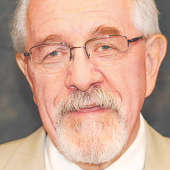- Christmas shopping is done, presents wrapped, strings attached? (12/14/16)
- Cecil is dead and human lives are threatened every day (8/12/15)
- As state flags go, Nebraska's ranks 50th (7/8/15)
- When everything looks like a nail (4/29/15)
- Who remembers to coal slurry pipeline debate? (3/11/15)
- More revelations in Department of Corrections mess (12/17/14)
- The Legislature becomes more Republican (11/19/14)
Opinion
Ernie's back, and so is the death penalty
Wednesday, March 6, 2013
The return of Omaha Sen. Ernie Chambers from his four-year term-limit-driven exile has also meant a return of discussions about the death penalty.
A couple of Chambers' bills deal with the way Nebraska courts decide whether to execute someone (LB542) as well as an outright repeal of the death penalty (LB543) and replacement with mandatory life in prison without parole.
In 134 years, 37 people have been legally executed for the crime of murder in Nebraska. The first was Samuel Richards who was hanged on Jan. 15, 1879. Allison Cole and Allen Grammer were the first to die in the electric chair on Dec. 20, 1920, the only time the state had back-to-back executions on the same day. Mass murderer Charles Starkweather, convicted in 1958 for killing 11 people, was the last to die in the electric chair (June 15, 1959) before the United States Supreme Court banned executions in 1972.
Three men have died since that ban was lifted in 1976. Harold Lamont "Walkin' Wili" Otey died on Sept. 2, 1994, for the death of Jane McManus in Omaha. John Joubert was executed July 17, 1996, for the deaths of Bellevue-area newspaper carriers Danny Eberle and Christopher Walden. Robert E. Williams was the last one electrocuted on Dec. 2, 1997, for the deaths of Catherine Brooks, Patricia McGarry and Virginia Rowe in Lincoln in 1977. In 2008, the state Supreme Court ruled that electrocution was cruel and unusual punishment. A year later, the Nebraska Legislature adopted lethal injection as the method of execution. The state's highest court set the first execution under the new method for June 14, 2011, but stayed that execution based on a defense attorney's objection that the sodium thiopental the state purchased from a company in Mumbai fails to comply with U.S. pharmaceutical standards.
Nebraska law requires that someone convicted of murder be subjected to a second trial by jurors to determine if the aggravating factors surrounding the crime outweigh any mitigating factors. If they do, a three-judge panel then decides whether the death penalty is warranted. They look at nine aggravating circumstances, such as whether the murder was done for hire or to cover up evidence of another crime. Chambers' LB542 would eliminate one that says: "The murder was especially heinous, atrocious, cruel, or manifested exceptional depravity by ordinary standards of morality and intelligence." He told the Legislature's Judiciary Committee that aggravator "is the most litigated, judicially-interpreted, tweaked and defined, confusing, unworkable, disagreed upon aggravator in the litter."
Chambers' LB543 would abolish the death penalty and replace it with mandatory life without parole. Opponents of the death penalty emphasize that such a move prevents the execution of an innocent man. On March 25, 1887, William Jackson Marion was hanged for the murder of John Cameron. However, Cameron turned up alive in 1891. Marion received a posthumous pardon by the State of Nebraska on the 100th anniversary of his execution.
Proponents of the death penalty say it will work as a deterrent only if administered in a timely fashion. Starkweather was executed almost exactly a year after his sentencing; the shortest time on death row was the four months served by Gottlieb Neigenfind. He was executed March 13, 1903. By 1994, that number had jumped to 17 years for Otey, the first person executed after Starkweather.
The most recent prisoner to be scheduled for execution has been on death row for more than 30 years. Carey Dean Moore was convicted in 1979 of the murder of two Omaha cab drivers. He has received six stays of execution since then, including the one dealing with the lethal injection drug.

